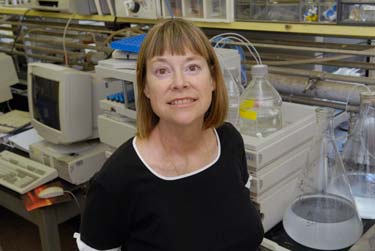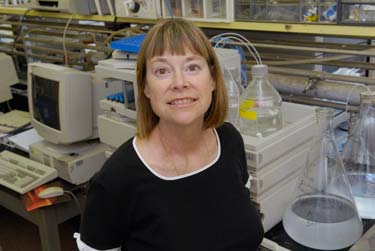 KINGSTON, RI – February 26, 2008 — The U. S. Department of Homeland Security announced today the selection of the University of Rhode Island and Northeastern University as co-leaders of a new Center of Excellence for Explosives Detection, Mitigation, and Response. Each institution will receive a multi-year grant of up to $2 million per year over a period of four to six years. The selection was part of an announcement of five new Centers of Excellence across the country, each consisting of teams of academic institutions that are leaders in their fields of study.
KINGSTON, RI – February 26, 2008 — The U. S. Department of Homeland Security announced today the selection of the University of Rhode Island and Northeastern University as co-leaders of a new Center of Excellence for Explosives Detection, Mitigation, and Response. Each institution will receive a multi-year grant of up to $2 million per year over a period of four to six years. The selection was part of an announcement of five new Centers of Excellence across the country, each consisting of teams of academic institutions that are leaders in their fields of study.
The University of Rhode Island was selected by the Department of Homeland Security’s Science and Technology Directorate through a highly competitive grant process. URI will be the Center’s co-leader for education, while Northeastern University in Boston will be co-leader for research.
 Professor of Chemistry Jimmie Oxley (shown above), an internationally renowned expert in explosives at the University of Rhode Island said, “This grant from Homeland Security recognizes URI’s leading research and outreach in explosives, energetic materials and pyrotechnics and its ability to partner with other institutions doing work in these areas. Our team is pleased to be working with Northeastern University to further science and education in these fields.
Professor of Chemistry Jimmie Oxley (shown above), an internationally renowned expert in explosives at the University of Rhode Island said, “This grant from Homeland Security recognizes URI’s leading research and outreach in explosives, energetic materials and pyrotechnics and its ability to partner with other institutions doing work in these areas. Our team is pleased to be working with Northeastern University to further science and education in these fields.
“As the lead education institution, we hope to involve undergraduate students, graduate students and those enrolled in certificate programs. This vote of confidence from Homeland Security is consistent with extensive work we have done for other federal agencies and authorities in England and Israel in the battle against terrorism,” added Professor Oxley who will co-lead the new center. Among her research topics are detecting explosives in human hair; pipe bombs, considered the weapon of choice for terrorists; and liquid explosives.
Oxley works with the Federal Bureau of Investigation, the Federal Aviation Administration, police agencies across the country, the United Kingdom and Israel on research related to explosives and terrorism, and she is often a first choice of the media when explosives are involved in terrorist attacks. She is frequently called upon to lend her expertise to high profile national and international incidences.
Oxley’s expertise in peroxide explosives, for example, made her much sought after by bomb squads following the bombings that took place in London in 2005. She was also called to collaborate with the FBI on simulations of the 1993 World Trade Center bombing and with British officials to examine large fertilizer bombs. Oxley also worked with New York law enforcement authorities and their canine units on bomb search training.
Oxley joined URI in 1993. She holds a bachelor’s degree from the University of California, San Diego; a master’s degree in chemistry from California State University, Northridge; and a doctorate in chemistry from the University of British Columbia.
“This is tremendous news for the University of Rhode Island, and for our entire state,” said Congressman Jim Langevin, (D-RI) chairman of the Homeland Security Committee’s Subcommittee on Emerging Threats, Cybersecurity and Science and Technology. “This recognition of URI’s status as a premiere education and research institution is well-deserved, and this new Center of Excellence will be an asset to the whole country.”
URI’s Vice President for Research and Economic Development Peter Alfonso noted that, “this award highlights the University’s expertise in this area, and places us in a position to receive additional federal funding that bears on explosive detection.”
The other Centers of Excellence, their areas of study, and academic partners include: border security and immigration (University of Arizona at Tucson and University of Texas at El Paso); maritime, island and port security (The University of Hawaii in Honolulu and Stevens Institute of Technology in Hoboken, N.J.); natural disasters, coastal infrastructure and emergency management (University of North Carolina at Chapel Hill and Jackson State University in Jackson, Miss), and transportation security (Texas Southern University in Houston, Tougaloo College in Tougaloo, Miss., and the University of Connecticut in Storrs, Conn.)
The URI/Northeastern Center of Excellence will be funded at approximately $4 million per year over a period of four to six years. URI will receive up to $2 million per year to develop and manage the center’s education programs, which may include undergraduate, graduate and certificate programs. URI may also participate in the center’s research component in conjunction with efforts at Northeastern. Further details on funding and projects will be developed as URI engages in further discussions with the Department of Homeland Security.
“We congratulate and look forward to working with the University of Rhode Island as co-leader, with Northeastern University, of the new DHS Center of Excellence for Explosives Detection, Mitigation and Response. Dr. Oxley and her team have demonstrated impressive expertise and commitment in this critical area of science and technology,” said Dr. Matthew Clark, Director of University Programs at the DHS Science and Technology Directorate.
Oxley is a founding member and a co-director of the Rhode Island Forensic Science Partnership, which is a collaboration of the Rhode Island Crime Laboratory, based at the College of Pharmacy, URI faculty members in textiles, chemistry, chemical, electric, computer engineering, the state Department of Health, the state’s law enforcement community, and the insurance industry. Early in the partnership’s history, Oxley organized a course for 800 Iowa law enforcement and school officials on how to handle school bomb threats in the wake of the student attacks in Columbine, Colo.
She played a key role in developing the forensic science minor and the chemistry and forensic chemistry major at the University.
Oxley is also the organizer of the very successful Forensic Science Seminar Series, which draws some of the influential names in forensic science to the Kingston Campus during the spring and fall semesters. The seminars are free and open to the public.

